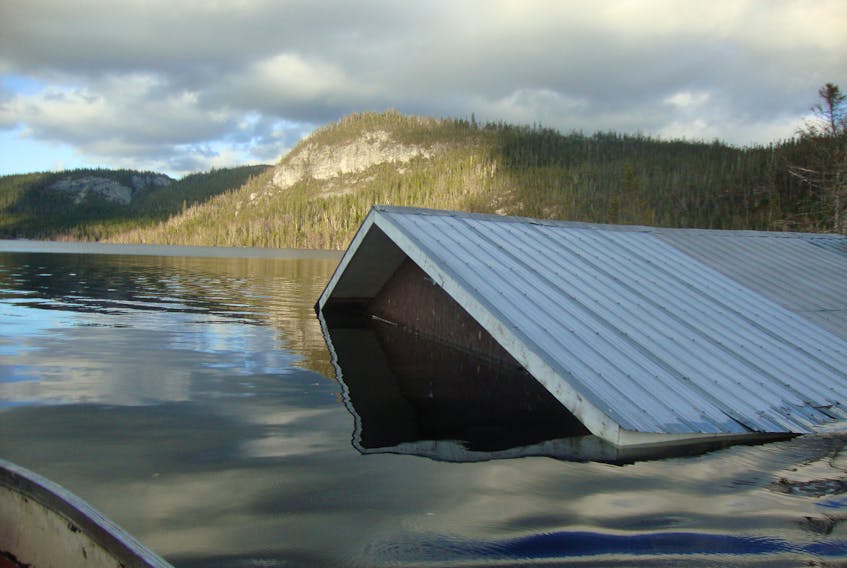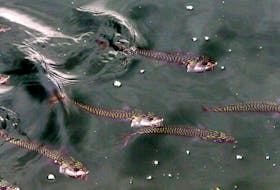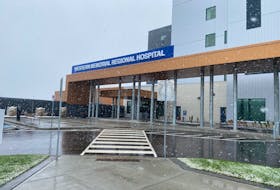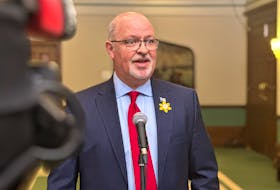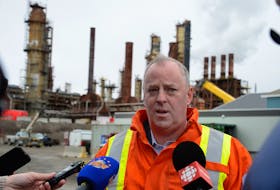Owners of cabins that floated off their foundations at Bottomless Pond have finally received good news.
In a positive development the provincial government has relieved the cabin owners of any lease obligations they had pertaining to the properties.
But bad news remains. The cottage getaways on the pond — located between Deer Lake and Gros Morne National Park, are still inaccessible.
Bottomless Pond flooded after a torrential rainstorm struck western Newfoundland in January 2018. When the snow melted that spring, the pond did not drain as it normally would and water levels remained unusually high.
The flood waters, which have been slightly receding and rising ever since, inundated the cabins and nearly submerged them fully by the spring of 2018.
Late this spring, the cabins all lifted off their foundations and began floating around the lake.
Mark Hoyles, one of the affected cabin owners, has finally been notified by the provincial Department of Fisheries and Land Resources that his remote cottage licence has been cancelled.
In a letter sent to him by the department responsible for Crown lands, he was told his property has now reverted back to Crown lands and he no longer has any permission to occupy the site.
Hoyles said his brother, who owned a cabin next to his, received the same letter and he expects that all five affected cabin owners will receive the same notification if they have not already.
Hoyles, who has not paid fees associated with his leased land since the problems began last year, has been fighting for the now granted exemption.
But he said the fight isn’t over yet. He wants to be compensated or reimbursed somehow for the complete loss of his investment.
He said some help in that regard would go a long way toward building a new cabin somewhere else.
“If the water had receded so we could have salvaged our cabins and only had to renovate the water damage, we wouldn’t be fighting,” said Hoyles. “The pond hasn't receded and our cabins are not salvageable. This is the only reason why we feel that we deserve some sort of compensation.”
It is believed the natural drain that normally regulates water levels at Bottomless Pond has become clogged with debris deposited during the flooding.
Hoyles said the pond reached 27 feet above the traditional high-water mark this past June, when the cabins began to float.
He said it has receded about three feet since then, but is still nowhere near normal levels.
He said government has informed him there is nothing in place to address emergency disaster relief for the unfortunate cabin owners.
He suggests the unique circumstances of Bottomless Pond should warrant more action than lease cancellations.
“In most places that have flooded and that have had water damage, the water did recede and the properties have been salvageable,” he said. “This pond is not receding and the properties are not salvageable, so we are just at a loss.”
He said some cabin owners may be in a better position than others to replace their remote retreat, but Hoyles said it will be a challenge for him to start again from scratch.
He estimated it would cost him at least $50,000 to find a new location, prepare the land and build a new cabin.
In an emailed response to a request for an interview, the Department of Fisheries and Land Resources said it would not discuss how it has handled individual land titles, but did say it has complied requests from several title holders at Bottomless Pond to cancel their remote cottage licences.
In addition, the department has initiated a reserve around the pond to prevent additional applications.
Compensation appears highly unlikely.
The department said its Crown Lands Division provides title only and does not insure title holders against any adverse situation that would prevent access or use of the property.
“Just as Crown lands can’t be expected to provide insured protection from any and all surface water floods, it can’t provide protection from unexpected water table increases,” read the prepared statement.
Hoyles and other affected cabin owners have started a petition to try and convince government to do more to compensate them because of their unique situation.

